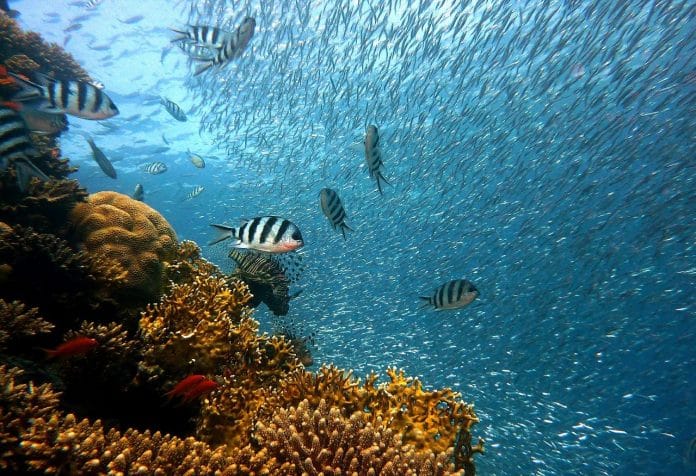The international community has recently been recognising the importance of coral reefs with fresh zeal. Speeches and statements are currently abounding, creating an urgency to act.
During the most recent UN Summit on Biodiversity, many heads of state and the United Nations Secretary General recalled the copious socio-economic benefits of these ecosystems.
Just this past November, the leaders of the G20 pledged to preserve the planet, in particular coral reefs and ocean ecosystems.
The recent publication of the 5th Global Biodiversity Outlook (GBO5) in September confirmed, with high confidence, that Aichi Target 10 — which concerns reducing pressures on coral reefs and other vulnerable ecosystems impacted by climate change or ocean acidification — has not been achieved.
What’s more, coral reefs have “shown the most rapid increase in extinction risk of all assessed groups” due to climate change and other human pressures. It is in this context that the members of the International Coral Reef Initiative (ICRI), a global partnership between nations and organisations, are mobilising to safeguard coral reef ecosystems.
Beyond beauty: reasons to save the reefs
Coral reefs play a fundamental role in the health and function of our planet, impacting us all whether we live near a reef or not. If reefs lose their integrity, or are otherwise destroyed, this will cease to be the case.
Often dubbed the rainforests of the sea, coral reefs harbour a vast number of species and yield high productivity levels. Covering less than one percent of the ocean floor, reefs support an estimated 25% of all marine life, with over 4,000 species of fish alone.
Reef structures play an important role as natural breakwaters, which minimise wave impacts from storms such as cyclones, hurricanes or typhoons. Their beauty makes coral reefs a powerful attraction for tourism; well-managed tourism provides a sustainable means of earning foreign currency and employment for many people around the world, including in remote areas of developing countries.
Estimates indicate that coral reefs account for $2.7 trillion per year in ecosystem service value. And yet, we have lost 50% of the world’s reefs and they continue to decline in the face of anthropogenic threats including climate change, pollution, unsustainable tourism, and destructive fishing.
The safety, well-being, food, cultural heritage and economic security of at least one billion people are subsequently at risk.
Coral reef ecosystems and the CBD Post-2020 Global Biodiversity Framework
In May 2020, ICRI members adopted a recommendation for the inclusion of coral reefs within the Convention on Biological Diversity (CBD) Post-2020 Global Biodiversity Framework (GBF). It includes a set of clear indicators that measure the health, integrity and function of coral reefs including live coral cover, coral reef extent, fish abundance and coral reefs that are under some form of area-based management.
Through the recommendation, all CBD parties are strongly encouraged to prioritise coral reefs by including clear, specific and actionable indicators in the GBF, which will inform interventions aimed at improving reef integrity, quality and function.
Also read: ‘Worst of the worst of the worst’ — Why 2020 has seen so many wildfires
Monitoring the status of coral reefs worldwide
The Global Coral Reef Monitoring Network (GCRMN) is an operational network of ICRI with the primary task of reporting on the condition of the world’s coral reefs.
Since its inception, the GCRMN has produced a range of global, regional and thematic reports on coral reef status and trends. It is currently working on the production of the GCRMN Status of Coral Reefs of the World: 2020. It will be the first such global report to be released in 12 years and is planned for early 2021.
The data acquisition and homogenisation stage was completed earlier this year with the acquisition of 195 datasets from 75 countries. These datasets include more than 1,7500,000 observations of 23 different variables recorded from over 100,000 transects.
Time to invest in coral reefs
A recent assessment conducted by the Conservation for Biodiversity High-Level Panel estimated that the global investment required for coral reefs is at least five times greater than current levels.
As it stands, there is no dedicated global financial instrument for coral reef protection. To address this funding gap, the Global Fund for Coral Reefs — a new first-of-its-kind fund to protect coral reefs — was launched on 16th September, on the sidelines of the 75th Session of the UN General Assembly.
A coalition of partners — including the Prince Albert II of Monaco Foundation and the Paul G. Allen Family Foundation — convened to mobilise resources in a bid to make coral reefs more resilient.
The Fund, which seeks to raise and invest USD $500 million in coral reef conservation over the next 10 years, is a finance instrument that blends private and public funding. It will also support businesses and finance mechanisms that improve the health and sustainability of coral reefs and associated ecosystems while empowering local communities and enterprises.
ICRI is also partnering with the World Economic Forum and UpLink – a digital platform to crowdsource innovations to accelerate the SDGs – on the second Ocean Solutions Sprint, in calling for solutions to restore, protect and invest in the ocean.
This article was first published in World Economic Forum.
Also read: There is a ‘natural aerosol factory’ in the Himalayas and it affects climate, study finds






